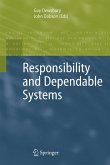This book brings together for the first time two important features of a computer system to be embedded in an organisational context: responsibility, meaning whether the computer system properly supports the organisational responsibilities that people are allocated; and dependability, which means whether it does so in a way that people can justifiably trust it to perform its operation correctly.
Organisational responsibility is examined from philosophical, social and practical viewpoints, which then leads to a workflow design which supports those responsibilities. The approach pays particular attention to looking at what happens when things go wrong and the adjustments and workarounds that people make to fulfil their responsibilities when their primary operational tasks are unachievable or frustrated, and how these alternative strategies can be incorporated into the workflow design. The application of the method to multi-organisational contexts is dealt with insome detail.
Organisational responsibility is examined from philosophical, social and practical viewpoints, which then leads to a workflow design which supports those responsibilities. The approach pays particular attention to looking at what happens when things go wrong and the adjustments and workarounds that people make to fulfil their responsibilities when their primary operational tasks are unachievable or frustrated, and how these alternative strategies can be incorporated into the workflow design. The application of the method to multi-organisational contexts is dealt with insome detail.
From the reviews:
"Unique consideration of social and human factors in designing responsibility and dependability into complex systems makes this treatise appropriate for system engineers, social scientists, and graduate students. ... Responsibility modeling is discussed in detail, and useful tools are presented for the analysis and technical design of complex systems. ... The book is an appropriate length, and contains a good index and list of references ... . I recommend this book ... ." (Brad Reid, Computing Reviews, January, 2008)
"Unique consideration of social and human factors in designing responsibility and dependability into complex systems makes this treatise appropriate for system engineers, social scientists, and graduate students. ... Responsibility modeling is discussed in detail, and useful tools are presented for the analysis and technical design of complex systems. ... The book is an appropriate length, and contains a good index and list of references ... . I recommend this book ... ." (Brad Reid, Computing Reviews, January, 2008)








